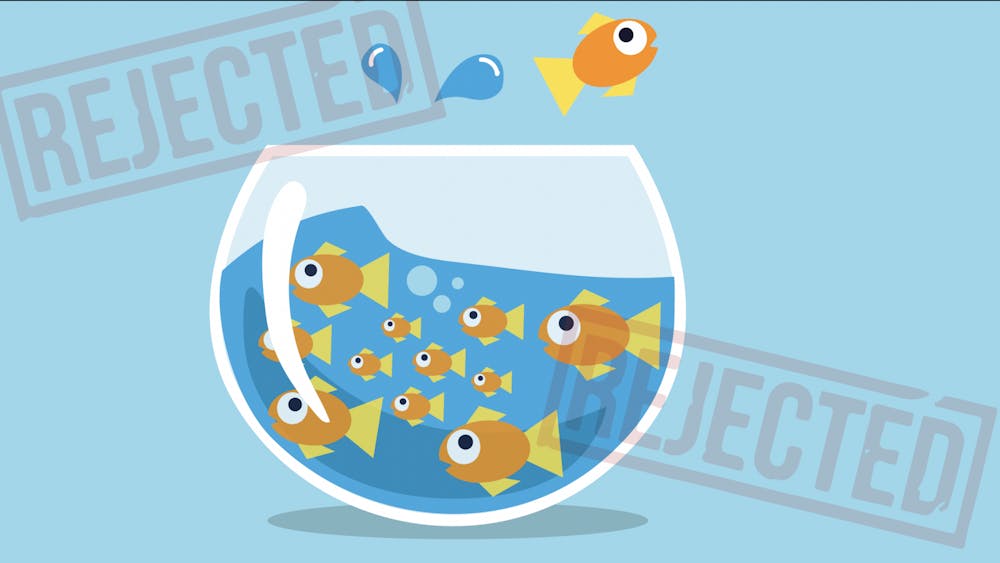Every autumn, first years’ naive smiles fade into competitive grimaces. The culprit? Penn’s competitive club application process.
Two months into the school year, the reality of life at an Ivy League is setting in for our newest class of students. Club applications offer the first chance for first years to prove that they belong as Quakers. While joining a community can offer a source of pride and belonging for new students, every acceptance comes with the price of rejection.
Our new students are left wondering: What do you do if the community you want doesn’t want you?
Perhaps the most recent round of club applications brought you a rejection; perhaps it brought you many. To my dismay, in my first-year fall, I was rejected from all but one club I applied to. I quickly learned that the exorbitant demand for a limited supply of spots meant someone always had to lose.
Dear first years: Surprise! In your four years here, you’ll face rejection.
Despite “Penn Face” or your aggressive classmate in ECON 1010 who might convince you otherwise, every student at Penn will fail. For one, the math for constant success just doesn’t shake out. There are too many smart, qualified students grabbing for the allure of the same internships and club acceptances.
My morning commute on Locust Walk reminds me that every student here was once a big fish in their hometown pond. When 10,000 talented fish start swimming together in one pool, competition and subsequent rejection will ensue.
This realization doesn’t make rejection hurt less, though. Maybe you danced for ten years but were rejected by Masti. Perhaps you thought you were a perfect match but weren’t accepted into MUSE or WEDIG. You love to sing but didn’t even get callbacks for Glee.
In the face of rejection, you might wonder: Maybe, everyone here is more talented than me.
To new students unaccustomed to Penn’s competitive nature, it’s easy to ruminate after a surprise rejection. You might catch yourself thinking, “Maybe if I answered that one interview question differently,” or “Maybe if my coffee chat was a bit less awkward.” The worst of the self-deprecating thoughts: “If only I was smarter, louder, or funnier.”
Now, as a junior, I’m all too familiar with the post-rejection feeling of embarrassment and self-doubt. I can procure a laundry list of research jobs, board positions, or club acceptances that I did not receive.
The secret is that my life at Penn became a lot easier when I became okay with being the little fish. The catalyst for my pivot from perfectionism was Penn’s Anti-Resume Project.
After a particularly brutal no, I turned to the internet to search for advice and shared misery. The Anti-Resume Project shares the behind-the-scenes rejections of some of Penn’s most successful students. Reading story after story of students who persevered through no’s reminded me that I wasn’t alone.
The Anti-Resume Project reveals that Penn is an ecosystem of talent, motivation, and drive. We all have something valuable to offer our community. Sometimes, though, someone else is just the bigger fish.
In my past two years here, I learned more about myself from being the little fish than I ever learned from celebrating my own accomplishments. How? By watching others succeed. Resist the temptation to view your hallmates as competition. Instead, look to each other as inspiration. Our classmates are best-selling authors and tech startup wizards — celebrate them! You won’t fail forever, so use your low points to uplift others.
First years: Rejection teaches resilience.
Don’t let the failures you face in your first semester stop you from pursuing what you love. If you aren’t failing, you’re missing an opportunity to learn what you’re truly passionate about. Do you really want to join that club, or are you just tempted by clout chasing? Sure, rejection hurts, but it hurts less once you realize everyone else faces rejection. Complain, cry, then carry on. If failure is unavoidable, you might as well fail aiming for what you truly desire.
Dear first years: the transition from being the big fish in high school to the little fish at Penn is hard. Yet, learning to be the little fish is a rite of passage. It will make you a stronger student and a better person.
In the next four years, sometimes you’ll be the big fish, dominating the Penn pond and staying afloat with ease. Sometimes — and if you’re like me, most of the time — you’ll be the little fish, learning from the role models around us.
So why did I choose Penn?
Because I wanted to be the little fish.
FIONA MILLER is a junior at Wharton studying Behavioral Economics and Social Impact from Roanoke, Virginia. Her email is fimiller@wharton.upenn.edu.









